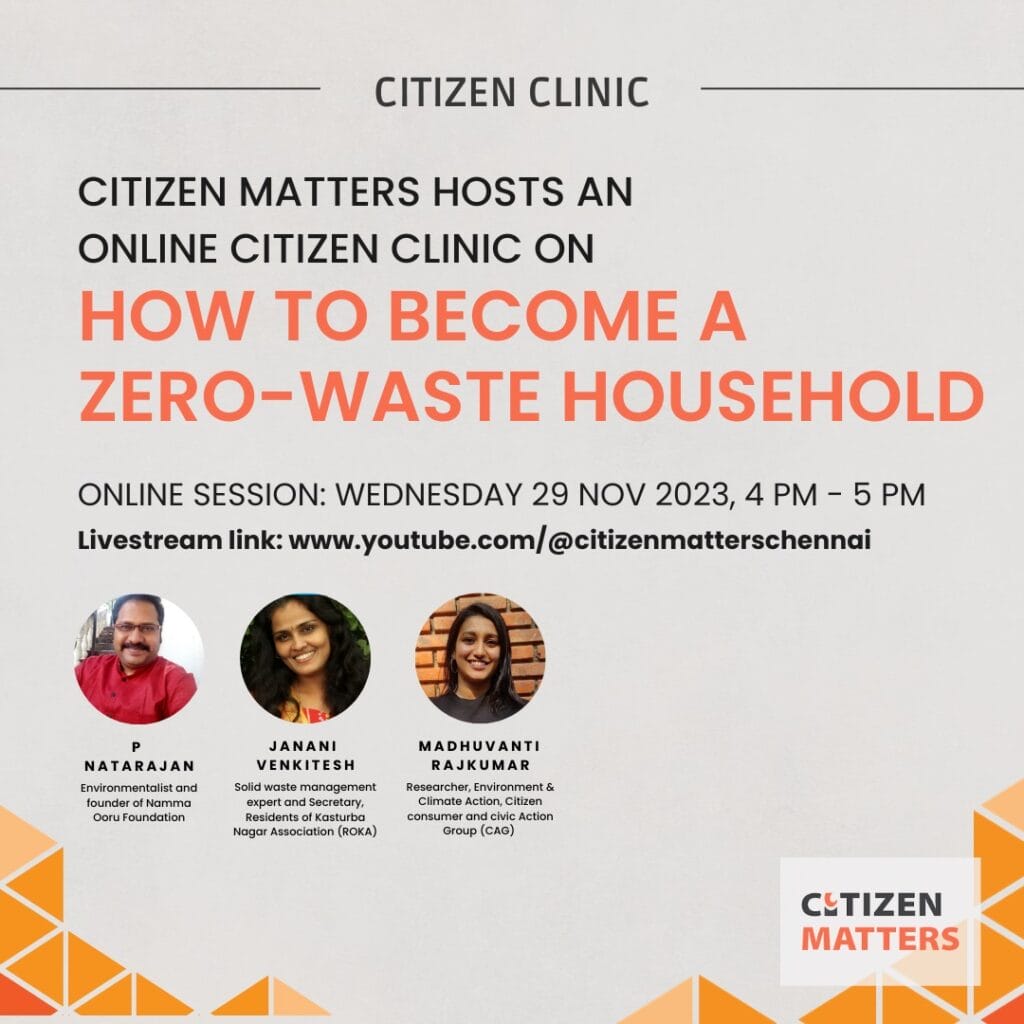Citizen Matters Chennai organised a Citizen Clinic on how to become a zero-waste household on November 29 with a panel of experts. The online clinic provided answers on how to segregate waste at source; how to avoid plastic and what are some eco-friendly alternatives; how to find recycling units near your home and how to get help with composting in Chennai.
The panel had three experts who shared the best practices and personal experiences in moving towards minimal waste generation. The panellists included P Natarajan, founder of Namma Ooru Foundation, a not-for-profit organisation engaged in solid waste management, rainwater harvesting, increasing green cover and building sustainable communities; Janani Venkitesh, an environment and Solid Waste Management enthusiast working with communities, institutions, organisations and other corporation/municipalities in implementing source segregation of waste on a purely voluntary basis; and Madhuvanthi Rajkumar, Researcher-Environment & Climate Action at Citizen consumer and civic Action Group (CAG).

Read more: What do we do with Chennai’s legacy waste?
Disposing one-time plastic/packaging waste in Chennai
Janani, who agrees that it is not possible to completely avoid ordering food online, suggests going to the hotel in person and buying food in our own containers to avoid collecting the packaging waste. In situations where one orders food, she suggests cleaning and drying of all packaging waste irrespective of the material used. This is important because these types of plastic/other packaging material go into the blue bin meant for recyclable dry waste. The waste in these bins does not get recycled immediately so the waste materials need to be dry.
Speaking on the one-time plastic used in grocery packaging, Natarajan says that the immediate solution is to collect the plastic and send it to the cement factories. The problem here is that the factories do not take low-volume waste and so he suggests that the city corporation can play a role in collecting this waste in large volumes and sending it to the cement factories.
However, as a long-term solution, Natarajan says that the government, manufacturers and consumers have to come together to avoid generating such one-time packaging waste. To phase out the use of single-use plastic in packaging, Madhuvanthi says that the onus should be on the manufacturers and they should start with product redesigning. Since the government has the authority to provide a licence to these manufacturers, Natarajan says the government should interfere at the licensing stage to promote eco-friendly packaging.
Waste glass bottles, yet another challenge
Speaking on disposing of the waste glass bottles, Natarajan says that there is a gap between the street-level scrap shops and the large-scale recyclers. This gap can be filled only when the two are connected and the large-scale recyclers pay the scrap shops to get these waste bottles.
Janani suggests the following contacts for depositing the glass bottles:
Edward Nathan : 94440 80386
Xavier: 89392 01207
SPRECO (all kinds of hard/soft plastics/MLP): +91 99620 65513
ROKA (collection drives, SWM awareness and implementation): 9791103797
Read more: Can Chennai ever become a bin-less city?
Segregating and disposing of domestic hazardous wastes
Pointing out that India is the third largest producer of e-waste and our Extended Producer Responsibility covers e-waste too, Madhuvanthi notes that though the policy framework is in place, the implementation is close to non-existent. Speaking on the practical solutions, she says that the Greater Chennai Corporation (GCC) has said that each zone will have two domestic hazardous waste collection centres and the residents can drop the waste at these centres.
However, she suggests the GCC allocate at least one day a month to collect hazardous waste like e-waste and also advertise such initiatives for better reach.
Since the bio-medical waste is minimal at the household level, Natarajan suggests the residents put them with sanitary waste for the time being as there is no proper mechanism for disposing of such bio-medical waste in Chennai. In the case of a gated community, the commercial players can be roped in to pick up the bio-medical wastes separately.
Recycling waste
The recent initiative aimed to eliminate single-use plastics and plastic bottles for homecare products in Chennai is called Refillables. There are mobile refilling stations and one at Wasted 360 Solutions, where the users can refill homecare products like detergents, toilet cleaners and multi-purpose cleaners.
Similarly, CAG also has a database of zero-waste stores in Chennai which can be located here.
Some of the aggregators/organisations in Chennai that are working on waste disposal:
Recycle mart bulk waste and other waste: +91 96000 68698
Wasted360: https://www.indiawasted.com/
Daily Dump for home composting and community: +91 72006 42300
Namma Ooru Foundation (Composting & SWM): https://nammaooru.org/
Breaking the mental barrier to segregating waste in household
One of the questions received from the citizens was how to break the mental barrier and the laziness in segregating the waste into different bins at the household level, especially when others in the same apartment were not taking the same initiative. Pointing out that we are already in crisis, Natarajan says that it is always better to do the right thing and not the easy thing. Janani suggests that residents who segregate the waste properly can create awareness among their fellow residents and build a community practice on segregation at the apartment level.
We need to be mindful of our consumption and keep a check between the needs and the wants. We need to remember the three Rs – Refuse, Reduce and Reuse. The other way to reduce waste is to think about the life span of the product and the amount of resources that have gone into making the product. This will be a first step towards mindful consumption.
Follow the complete discussion here: